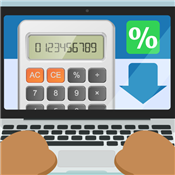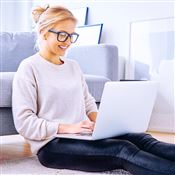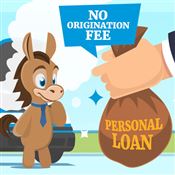How Much Personal Loan Can I Get
Need money quickly? Personal loans may be a good option. Find out how your debt, salary, and other factors influence how much your loan can be.
 |
Personal loans are easier than ever to get today, especially through an online lender.
Many lenders offer loan amounts as high as $50,000 or $100,000, but will you qualify for them? Here's how to determine how much personal loan you can get.
What Determines Your Loan Amount?
Many factors determine your loan amount, starting with the lender and the loan amount range they offer. Some lenders offer loans up to $25,000, yet others offer personal loans up to $100,000.
How much you can get depends on a variety of factors, including the factors below.
Credit Score
Your credit score determines if you get approved for a personal loan and for how much. Credit scores range from 300 to 850, but most consumers fall somewhere in between, usually around 660 - 680.
Any credit score over 670 demonstrates that you're a good credit borrower and make sound financial decisions. The higher your credit score is, the more a lender will let you borrow and the more favorable terms they'll offer.
Even personal loan lenders that allow lower credit scores will offer you less favorable terms and lower loan amounts if you have a low credit score.
Fortunately, it's easy to fix your credit score. If you don't know your credit score, check with your bank or credit card companies - most offer free monthly credit score access. Use it as a guide to determine where you stand.
Salary
Your annual salary determines what you can afford. Lenders use your salary to determine how much you can borrow.
Some lenders have a minimum income requirement, that if you don't meet, you can't get a loan. Others put more focus on your debt-to-income ratio.
The key is to have a stable and reliable income and employment. If you change jobs often, lenders may not look at your job as stable and may consider you a high risk of default. If that's the case, they'll approve you for a much lower loan amount.
Debt to Income
Your debt-to-income (DTI) ratio measures your current debts plus the potential new loan to your income. This helps them determine if you'll qualify for a new loan and how comfortably you can afford it.
Lenders look at your DTI as one piece of the puzzle, but the lower you can get it, the more likely you are to get the loan amount you need.
You earn $5,000 a month, and you have a $1,000 mortgage, $300 car payment, and $100 credit card minimum payments. Your DTI is 28%, or 1,400/$5,000.
Every lender has a different DTI requirement, but the lower your DTI is, the better your chances are of getting approved for a larger loan. Aim for a 36% or lower DTI for the best results.
Cosigner
If you don't have "great" credit or you have a high debt-to-income ratio, a cosigner may help you get approved for the loan amount you want.
A co-signer with good credit and little to no debt can make your application more attractive, allowing personal loan lenders to lend you the money you need. Lenders allow co-signers to offset the risk you pose if you applied alone.
Choose your co-signer wisely, though, because if you default on the loan, they are still responsible for the debt, which is why some lenders allow co-signers.
How to Improve Your Odds of Getting Approved
Every lender has different underwriting requirements, but to improve your odds of getting approved, try the following:
- Get a copy of your credit report. Everyone has free annual access to their credit reports here, and you can see what you should change. Jot down every negative issue showing on your credit report and see how you can fix them.
- Bring all late payments current and keep paying your bills on time. Even one 30-day late payment hurts your credit score the most since your payment history makes up 35% of your credit score.
- File a dispute for any incorrect or inaccurate trade lines on your credit report. The Fair Credit Reporting Act protects all consumers. If you notice anything inaccurate on your credit report, write a dispute letter to the credit bureau reporting it wrong. Include details about what's incorrect and provide proof if you can.
- Bring all credit card balances down to 30% or less of your credit line. Your credit utilization is the next most significant part of your credit score. If you have more than 30% of your credit line outstanding, it hurts your credit score and increases your debt-to-income ratio. Pay your debts down, or show the lender that you'll use the personal loan proceeds to pay the debt off.
- Avoid applying for new credit. Every time you apply for new credit, it lowers your credit score slightly and increases your debt-to-income ratio, both of which can hurt your chances of approval and/or getting the loan amount you want.
- Ask a close family member or friend to co-sign your loan. If you can't qualify on your own, consider asking a friend or family member to co-sign. Before you do, make sure they have good credit, a low debt ratio, and are willing to take the risk of being a cosigner.
Bottom Line
Before you apply for a personal loan, think about what you can afford. Use a personal loan calculator to estimate the payment and see how it fits in your budget. Just because a lender approves you for a certain amount doesn't mean you can afford it or are comfortable with the amount.
Once you're comfortable with the payment, maximize your chances of securing the loan amount by improving your credit score, paying your current debts down, and keeping your income stable.
The more positive attributes your application has, the faster you'll get approved, the higher the loan amount you'll get, and the easier it will be to get the loan you need.
Write to Sam Hawrylack at feedback@creditdonkey.com. Follow us on Twitter and Facebook for our latest posts.
|
|
|








